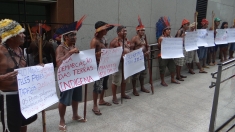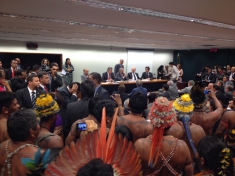Amazonian Dams Protested on International Human Rights Day
In observance of International Human Rights Day on December 10th, indigenous and other dam-threatened people in Brazil organized a series of demonstrations against Belo Monte and other destructive Amazonian dams on the Tapajós River and its major tributary, the Río Teles Pires. I was there, along with many other allies.

After travelling by bus to Brasília – the nation’s capital in central Brazil – about 50 Munduruku from the Tapajós Basin occupied the headquarters of the Federal Attorney General (AGU) demanding the immediate recognition of the boundaries of their traditional lands in the Middle Tapajós region. These lands would be directly affected by the huge São Luiz do Tapajós Dam, slated for construction on the Tapajós mainstream near the town of Itaituba. The Munduruku also demanded that Attorney General Luis Inacio Adams refrain from the all-too-often used practice of intervening in the judicial system to ensure a “Security Suspension” (Suspensão de Segurança), a legal artifice dating back to the military dictatorship that allows chief justices to unilaterally suspend court decisions without analyzing their merits, based on alleged threats to national security. In this case, the Munduruku called on the AGU to respect a decision publicized today by Ilan Presser, a federal judge in Mato Grosso state, that suspended the auction of the controversial São Manoel hydroelectric dam on December 13th.
Slated for construction less than a mile from the border of the Kayabi Indigenous Territory, the São Manoel Dam is one of five large hydroprojects planned on the Teles Pires River. The project was railroaded through the environmental licensing process by the Ministry of Mines and Energy despite protests from indigenous people. Technical staff and consultants at FUNAI – the governmental body tasked with overseeing indigenous people – have also warned that the cumulative impacts of these and other dams would have potentially devastating consequences for the Kayabi, Munduruku and Apiaká people, especially on migratory fish essential for their subsistence. According to Josias Manhuary Mundurukú "the AGU is our enemy; they do nothing good for us."

In the late afternoon, the Munduruku moved their protests to the Brazilian Congress, where politicians linked to large agribusiness and mining interests – known as “ruralistas” – were hastily convening to launch a special commission aimed at passing a constitutional amendment (PEC 215) that would transfer authority for demarcation of indigenous lands from the Executive branch to the Congress. At the meeting, the Munduruku and other indigenous people voiced their outrage at this maneuver, widely considered unconstitutional.
Also today, 25 Brazilian civil society organizations, led by the Xingu Vivo movement, issued a call for the Brazilian judiciary system to liberate itself from bureaucratic foot-dragging and corruption in order to ensure swift and unbiased decisions on key lawsuits related to human rights violations. One of the key demands of the letter is that a moratorium be decreed on the licensing and construction of hydroelectric dams in the Amazon region until studies on cumulative socio-environmental impacts of projects at the watershed level have been carried out. They're also calling for processes of free, prior and informed consultations and consent with indigenous people and other traditional populations, in accordance with the Brazilian Constitution and international agreements such as ILO Convention 169, which Brazil signed.
Additional protests against destructive Amazonian dams were organized from Altamira to Río to Paris, and additional actions are planned this week in Brasília. More information coming soon!
- Hydroelectric Dams in Pará and Two Serious Legal Offenses: Omission and Leniency (English, Portuguese, Spanish)
- Letter from Brazilian NGOs, calling for Justice Now! in the Amazon (Portuguese)
- Report from Xingu Vivo on actions around International Human Rights Day (Portuguese)
- Report from CIMI on Munduruku actions in Brasilia on Human Rights Day
- Munduruku indigenous people protest at Attorney General's office in Brasília (Portuguese)



